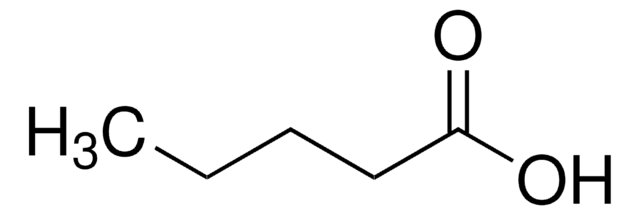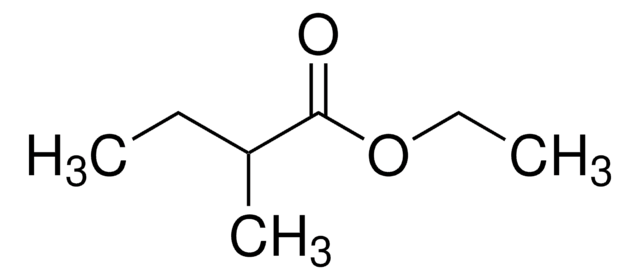W222100
Butyric acid
≥99%, FG
Synonym(s):
Butanoic acid
About This Item
Fragrance grade
Halal
Kosher
meets purity specifications of JECFA
Recommended Products
biological source
synthetic
Quality Level
grade
FG
Fragrance grade
Halal
Kosher
Agency
follows IFRA guidelines
meets purity specifications of JECFA
reg. compliance
EU Regulation 1223/2009
EU Regulation 1334/2008 & 178/2002
FDA 21 CFR 117
FDA 21 CFR 182.60
vapor density
3.04 (vs air)
vapor pressure
0.43 mmHg ( 20 °C)
Assay
≥99%
form
liquid
autoignition temp.
824 °F
expl. lim.
10 %
refractive index
n20/D 1.398 (lit.)
pH
2 (25 °C, 10 g/L)
3 (20 °C, 10 g/L)
bp
162 °C (lit.)
mp
−6-−3 °C (lit.)
density
0.964 g/mL at 25 °C (lit.)
cation traces
As: ≤3 ppm
Cd: ≤1 ppm
Hg: ≤1 ppm
Pb: ≤10 ppm
application(s)
flavors and fragrances
Documentation
see Safety & Documentation for available documents
food allergen
no known allergens
fragrance allergen
no known allergens
Organoleptic
cheese; buttery; fruity
SMILES string
CCCC(O)=O
InChI
1S/C4H8O2/c1-2-3-4(5)6/h2-3H2,1H3,(H,5,6)
InChI key
FERIUCNNQQJTOY-UHFFFAOYSA-N
Gene Information
human ... HDAC1(3065)
Looking for similar products? Visit Product Comparison Guide
General description
Signal Word
Danger
Hazard Statements
Precautionary Statements
Hazard Classifications
Acute Tox. 4 Oral - Eye Dam. 1 - Skin Corr. 1B - STOT SE 3
Target Organs
Respiratory system
Storage Class Code
8A - Combustible corrosive hazardous materials
WGK
WGK 1
Flash Point(F)
161.6 °F - closed cup
Flash Point(C)
72 °C - closed cup
Personal Protective Equipment
Choose from one of the most recent versions:
Already Own This Product?
Find documentation for the products that you have recently purchased in the Document Library.
Customers Also Viewed
Our team of scientists has experience in all areas of research including Life Science, Material Science, Chemical Synthesis, Chromatography, Analytical and many others.
Contact Technical Service













